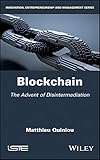Blockchain : the advent of disintermediation / Matthieu Quiniou.
Material type: TextSeries: Innovation, entrepreneurship and management seriesPublisher: London, UK : Hoboken, NJ : ISTE, Ltd. ; John Wiley & Sons, Inc., 2019Description: 1 online resource (167 pages)Content type:
TextSeries: Innovation, entrepreneurship and management seriesPublisher: London, UK : Hoboken, NJ : ISTE, Ltd. ; John Wiley & Sons, Inc., 2019Description: 1 online resource (167 pages)Content type: - text
- computer
- online resource
- 9781119629559
- 1119629551
- 9781119629573
- 1119629578
- 9781119629566
- 111962956X
- 005.74 23
- QA76.9.D32 Q85 2019
Includes bibliographical references and index.
The dominance of trusted intermediaries could be weakened by blockchain, a distributed ledger technology, one of the functions of which is to constitute timestamped proofs by replacing inter-individual trust with algorithmic trust. Blockchain self-executing smart contracts allow us to rethink the practice in the domain of e-commerce, interbank communication, fundraising (and ICOs), justice (timestamping evidence, acts authenticated by blockchain) and businesses in numerous sectors (entertainment, AI, health, real estate, tourism, transport, etc.) which attempt to propose new services by benefiting from blockchains. This book aims to put into perspective the technical innovations and the uses brought about by blockchain, by identifying that which has a medium- or long-term impact, all while taking into account the social, economic, judicial and administrative resistances that are likely to develop.
Part 1: The Blockchain: a Tool for Non-centralization and Disintermediation; Introduction to Part 1; 1. Non-centralized Architecture; 2. The Dynamics of Disintermediation; 3. Blockchain Prospects and Ongoing Improvements -- Part 2: Blockchain Technology for a New Socio-economic Paradigm; 4. Toward a Social Smart-contract?; 5. Proteiform and Multi-sectoral Transformations.
Description based on online resource; title from digital title page (viewed on September 26, 2019).
There are no comments on this title.
